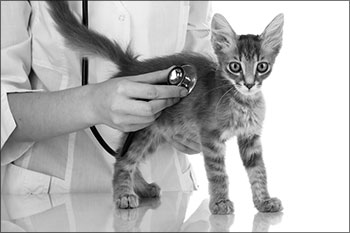Kitten season — an increase in litters and adoptable pets — seems to span three seasons, starting in spring and extending into fall. If you’re the proud owner of a new kitty — congratulations!

288
Tops on your to-do list: a full veterinary exam to help ensure many happy years together and prevent your newest family member from passing a parasite or disease to other pets or, in unusual cases, people.
“Exams are important to help identify problems early so that we start any appropriate treatment ASAP,” says Brian Collins, DVM, a lecturer in The Community Practice Service at Cornell University Hospital for Animals.
“Fortunately, the majority of kittens seen at veterinary hospitals are healthy with only minor problems such as parasites or an upper respiratory infection. Most kittens leave their first visit with a nearly clean bill of health.”
Lab work often will be limited to a test of his stool to detect parasites and a blood test to test for feline leukemia virus and feline immunodeficiency virus.
Here’s what to expect at a new kitten exam:
THE PHYSICAL
Purpose: determine overall health. “We keep our eyes and ears open for anything abnormal,” Dr. Collins says. “We do a thorough exam from nose to tail.”
The essentials: A check of temperature and heart and respiratory rate. Veterinarians will also look for heart murmurs, open fontanelles (soft spots in the skull when bones fail to close), abdominal hernias and lameness or orthopedic abnormalities. In male kittens, they make sure the testicles have descended from the abdomen into the scrotum as they should by 2 months of age.
Veterinarians take note of coughing, runny nose or discharge in the eyes — all signs of infection. They peek into ears and examine skin for signs of parasites and ringworm infection. If a kitten has a history of vomiting or diarrhea, they will feel the abdomen for evidence of discomfort and other abnormalities. They also may discuss the pros and cons of sterilization at different ages.
THE ORAL EXAM
Purpose: to check for an underbite, missing or extra teeth, gingivitis and cleft palate.
The essentials: In addition to examining the mouth, veterinarians will discuss daily home dental care because most cats develop evidence of gum disease by the age of 3, according to the American Veterinary Dental Society. Most cats will allow their teeth to be brushed if you introduce it gradually over a month or two. Start by letting him lick a feline toothpaste from your finger, then use a small feline toothbrush. Eventually, you can place the toothbrush in your kitten’s mouth for brushing.
NUTRITION
Purpose: to make sure the kitten has appropriate food during this time of rapid growth.
The essentials: Is the kitten too thin? Overweight? His weight will be recorded and monitored.
CHECK FOR PARASITES
Purpose: to find and eliminate them.
The essentials: “It is helpful if the client brings a fresh sample of the animal’s stool,” Dr. Collins says, “so that it can be inspected for any gross abnormalities as well as microscopic examination for parasites.”
If the kitten shows signs of feline distemper, his stool will be tested for that, too. Fecal exams should be done two to four times in a kitten’s first year, the American Animal Hospital Association says, while deworming should be done every two weeks from 3 to 9 weeks of age, then monthly until 6 months of age. “We commonly prescribe medications for gastrointestinal parasites, fleas, ticks and ear mites,” Dr. Collins says.
VACCINATIONS
Purpose: to protect against potentially deadly diseases.
The essentials: One shot guards against rabies, while a combination vaccine protects the kitten from respiratory illnesses and feline distemper.
BEHAVIOR SCREENING
Purpose: to help ensure your kitten grows into a social pet.
The essentials: The veterinarian may advise on teaching your kitten to use appropriate scratching surfaces.
AAHA guidelines point out that kittens have a high play drive, so provide toys to help prevent play biting. The veterinarian may ask about your litter box arrangement. Cats tend to prefer a clean, large box easily accessible but out of the way of busy household traffic.
BREED-SPECIFIC SCREENING
Purpose: to check for early signs of hereditary diseases. For example, Devon Rex, Ragdoll, American Shorthair, British Shorthair and Maine Coon cats are likelier to inherit the most common heart disease in cats, hypertrophic cardiomyopathy.
The essentials: Veterinarians examine the kitten’s body for possible signs. For example, if cardiac disease is a problem for the breed, a heart murmur can be an early indication. ❖



